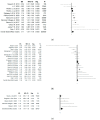Red and Processed Meat Consumption and Risk of Depression: A Systematic Review and Meta-Analysis
- PMID: 32937855
- PMCID: PMC7559491
- DOI: 10.3390/ijerph17186686
Red and Processed Meat Consumption and Risk of Depression: A Systematic Review and Meta-Analysis
Abstract
Depression is one of the leading causes of disability worldwide, with more than 264 million people affected. On average, depression first appears during the late teens to mid-20s as result of a complex interaction of social, psychological and biological factors. The aim of this systematic review with meta-analysis is to assess the association between red and processed meat intake and depression (both incident and prevalent). This systematic review was conducted according to the methods recommended by the Cochrane Collaboration and the Preferred Reporting Items for Systematic Reviews and Meta-Analyses guidelines. Relevant papers published through March 2020 were identified by searching the electronic databases MEDLINE, Embase and Scopus. All analyses were conducted using ProMeta3 software. A critical appraisal was conducted. Finally, 17 studies met the inclusion criteria. The overall effect size (ES) of depression for red and processed meat intake was 1.08 [(95% CI = 1.04; 1.12), p-value < 0.001], based on 241,738 participants. The results from our meta-analysis showed a significant association between red and processed meat intake and risk of depression. The presented synthesis will be useful for health professionals and policy makers to better consider the effect of diet on mental health status.
Keywords: depression; meta-analysis; processed meat; red meat.
Conflict of interest statement
The authors declare no conflict of interest.
Figures



References
-
- Disease G.B.D., Injury I., Prevalence C. Global, regional, and national incidence, prevalence, and years lived with disability for 354 diseases and injuries for 195 countries and territories, 1990–2017: A systematic analysis for the Global Burden of Disease Study 2017. Lancet. 2018;392:1789–1858. doi: 10.1016/S0140-6736(18)32279-7. - DOI - PMC - PubMed
-
- World Health Organization Depression. [(accessed on 7 August 2020)]; Available online: https://www.who.int/news-room/fact-sheets/detail/depression#:~:text=Depr....
-
- Fornaro M., Solmi M., Stubbs B., Veronese N., Monaco F., Novello S., Fusco A., Anastasia A., De Berardis D., Carvalho A.F., et al. Prevalence and correlates of major depressive disorder, bipolar disorder and schizophrenia among nursing home residents without dementia: Systematic review and meta-analysis. Br. J. Psychiatry. 2020;216:6–15. doi: 10.1192/bjp.2019.5. - DOI - PubMed
-
- Wang P.S., Aguilar-Gaxiola S., Alonso J., Angermeyer M.C., Borges G., Bromet E.J., Bruffaerts R., de Girolamo G., de Graaf R., Gureje O., et al. Use of mental health services for anxiety, mood, and substance disorders in 17 countries in the WHO world mental health surveys. Lancet. 2007;370:841–850. doi: 10.1016/S0140-6736(07)61414-7. - DOI - PMC - PubMed
Publication types
MeSH terms
LinkOut - more resources
Full Text Sources
Medical
Miscellaneous

